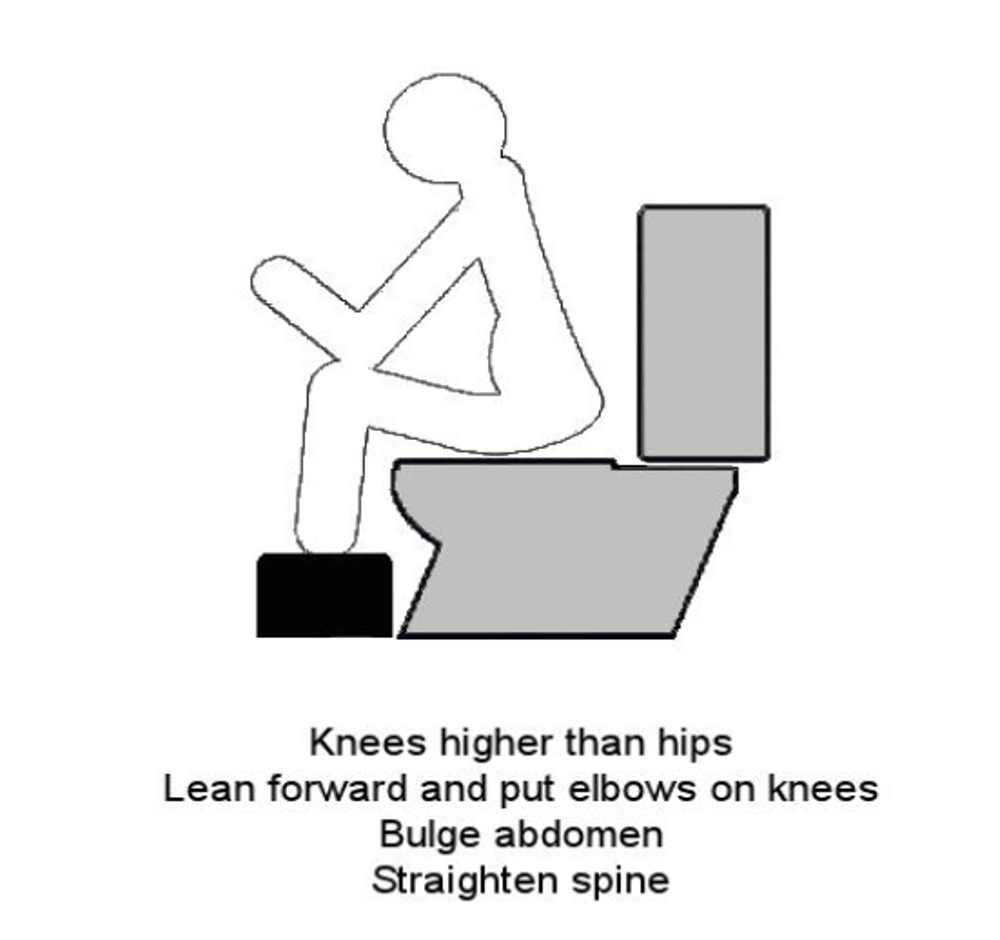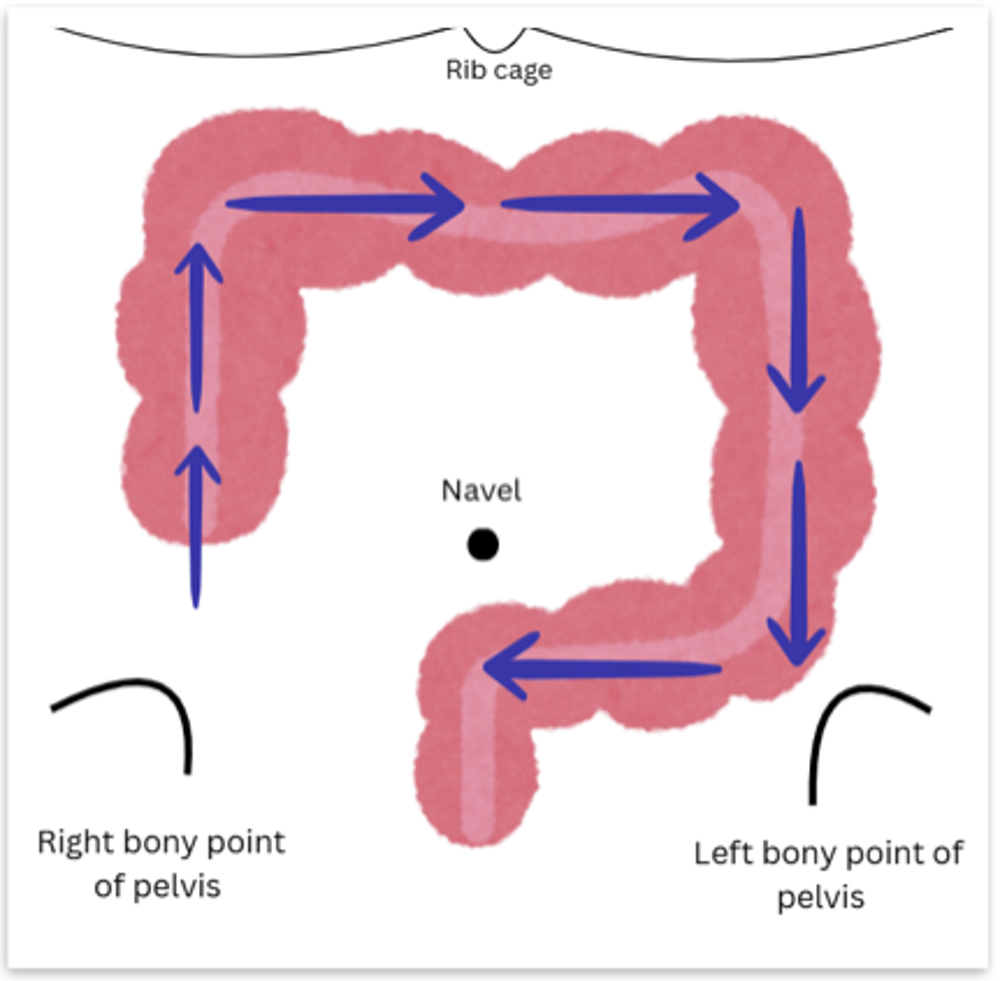What is constipation?
- When your bowels open fewer than three times a week.
- Pain or straining on passing stool.
- Stools which are hard and dry. Stools may be a larger clump or small pellets.
Symptoms of constipation
- Feeling uncomfortable or bloated in the abdomen.
- Having to strain to empty your bowels. This can cause haemorrhoids (piles) which may appear at the back passage and bleed.
- Women may find intercourse uncomfortable if the bowel is very full.
- Constipation can also cause bladder symptoms such as urgency, frequency and incontinence (bladder leakage).
Causes of constipation
- Irregular meals - especially skipping breakfast.
- Too much processed food.
- Not enough fibre in the diet.
- Not drinking enough fluid (less than 1.5 litres per day).
- Not drinking steadily throughout the day.
- Not allowing time to open your bowels within your day.
- Ignoring the urge to empty your bowels.
- Lack of physical activity - including standing or short walks.
- Uncoordinated bowel emptying. Some people do not fully relax the muscles around the back passage when they empty the bowel.
- Stress and anxiety.
- Irregular sleep patterns.
- Some medications such as opioids, anti-depressants, iron supplements, or blood pressure medication.
Conditions that may make constipation worse
- Pregnancy and childbirth.
- Painful anal conditions such as haemorrhoids (piles) or fissures.
- Emotional upset, stress, anxiety or depression.
- Underactive thyroid gland.
- Obstruction to the bowels by scarring, inflammation or tumours.
- Neurological conditions such as Parkinson’s Disease, Multiple sclerosis, Stroke, Diabetes.
- Irritable bowel syndrome.
- Food intolerances.
- Surgery.
- Lack of physical activity.
- Weak pelvic floor muscles.
What can I do about it?
- Eat enough fibre. Adults should aim for 30g of fibre per day.
- Make sure you drink enough (1.5 to 2 litres a day or 6 to 8 mugs).
- Eat breakfast and have a hot drink to stimulate the gut within 20-40 minutes of waking.
- Eat regularly.
- When you get the urge to empty your bowel, go to the toilet.
- Allow yourself plenty of time for toileting in your morning routine.
- Complete regular exercise. Keep active!
- Strengthen your pelvic floor muscles using the NHS Fife Pelvic Floor Exercise Leaflets.
- Try abdominal massage to help.
Fibre in the diet
Fibre acts like a sponge, it soaks up water as it passes through the gut. This makes stools both solid yet soft enough to pass.
How to eat more fibre
- Make changes to your diet slowly over several weeks.
- Eat wholemeal or wholegrain bread rather than white.
- Use brown pasta and rice instead of white.
- Eat high fibre breakfast cereals like Weetabix, Shredded wheat, Shreddies or real porridge (not instant porridge).
- Fresh fruit makes a good snack. Aim for 2 portions daily.
- Try to have at least 2 servings of vegetables daily.
- Beans, peas and lentils are a good source of fibre. They can be added to stews, soup and salads.
Supplementing fibre intake
Your pharmacist can give you advice on products such as Golden Linseed or Lepicol. These offer supplementary fibre if dietary changes are not enough.

Positioning on the toilet
If you can get into a good position on the toilet it will make emptying your bowel much easier. Try to recreate the squatting position as this helps the bowel empty.
- Get your knees higher than your hips.
- A foot rest can be useful, keep your feet flat.
- Lean forwards and put your elbows on your knees.
- Allow your tummy to bulge forward.
- Straighten your spine.
- Try to relax your body as much as possible.
Abdominal (tummy) massage
Gentle abdominal massage can help to move the poo through your bowel to help reduce symptoms of constipation, gas or bloating.
Using gentle pressure, start on the right hand side of the tummy.
- Sweep your hands up towards the rib cage for 10 strokes.
- Then sweep across the tummy towards the left for 10 strokes.
- Then sweep down the left side towards your hip for 10 strokes.
You can use a massage oil or cream to help with the massage if you wish.
Do not complete this massage if:
- You are pregnant.
- Have an unstable spinal fracture.
- Have an abdominal wound less than 6 weeks old.
- Have inflammatory bowel disease.

Laxatives
Some people will need to take a regular laxative. Speak to your doctor or pharmacist about what laxative may be appropriate for you.
Bulk forming laxatives work by increasing the bulk of the stool to stimulate the gut. It is important to drink plenty of fluid when taking this medication. Examples are Fybogel and Regulan.
Osmotic laxatives help to keep fluid in the stool and increase its bulk. It is important to drink plenty of fluid when taking this medication. Common examples are Laxido and Lactulose.
Stimulant Laxatives help to get the gut to work faster. An example is Bisacodyl. This type should be used short term only.
Are laxatives harmful?
- Constipation is usually improved by a good diet, drinking enough fluid and regular exercise. Medication is often not needed however, occasional use of a suitable laxative is harmless.
- Regular use should be avoided unless directed by a health care professional.
- Laxatives can cause abdominal pains and a feeling of needing to empty the bowel urgently if used in large doses. You may need to work with your doctor or pharmacist to find the right product and dose for you.
When should you see the doctor?
- Sudden changes in bowel habit, occurring for no obvious reason, lasting more than 3 weeks in people aged over 40 years.
- If there is new bleeding from the back passage.
- If there are new abdominal symptoms such as pain and/or persistent bloating.
- If constipation does not get better with simple treatments and is causing you trouble.
Further tests and investigations
If your constipation isn’t improved by some of these measures, you may be referred to see a specialist doctor who deals with constipation. They may decide to do some tests to find out why you have constipation. These may include:
- Colonic transit studies (to see how long food takes to pass through your gut).
- Anorectal physiology/proctography (to assess how your bowel functions when you open your bowels).
- Flexible sigmoidoscopy/colonoscopy (to look inside the bowel).
- MRI (to look for any prolapse of the bowel when it empties).
All of these would be discussed with you by the doctor.
Accessible formats
If you require this information in a community language or alternative format such as Braille, audio, large print, BSL, or Easy Read, please contact the Equality and Human Rights Team at: email: fife.EqualityandHumanRights@nhs.scot or phone 01592 729130. For people with a hearing or verbal impairment you can also contact the team through the NHS Fife SMS text service number on 07805800005.
